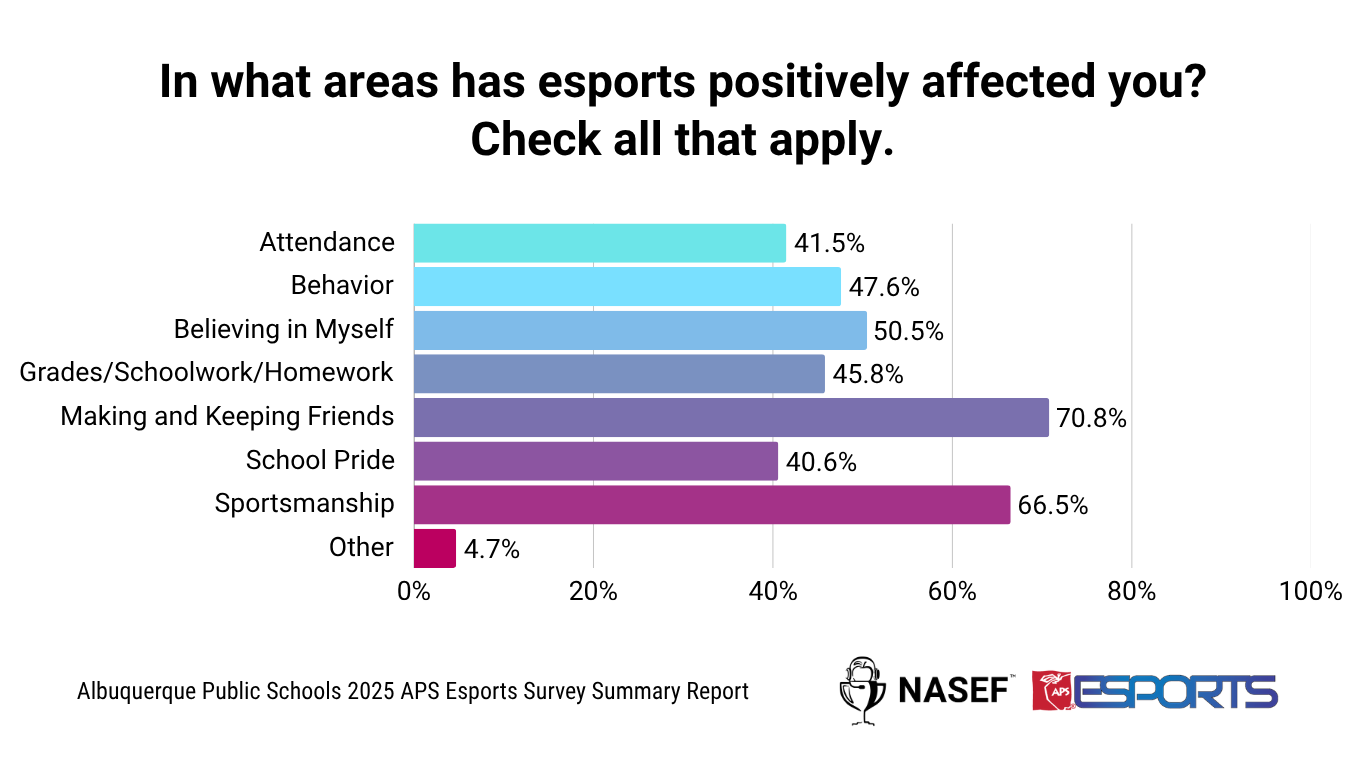Research
Scholastic esports is popular among students because of their love of gaming and with educators for its ability to provide an interest-driven learning environment. Beyond popularity, multiple research studies demonstrate its effectiveness; several studies are outlined below.
Moreno Valley Unified School District
The Moreno Valley Unified School District (MVUSD) has successfully implemented comprehensive scholastic esports programs across four traditional high schools, three alternative education schools, seven middle schools, and 22 elementary schools. The Riverside County Office of Education conducted a comprehensive study in 2023 and 2024, analyzing data from esports participants. The findings indicated a strong positive correlation between involvement in esports and improvements in school attendance, reduced suspension rates, social-emotional learning (SEL) metrics, and overall academic performance.
Standardized State Testing Results

Attendance Boost
In 2022-2023, students in esports attended school 7.34 more days on average than those who weren’t. For 2023-2024, a model factoring in demographics and past attendance showed that esports students had a 33.5% lower absence rate than non-participants.

Albuquerque Public Schools
Research conducted by Albuquerque Public Schools (APS) highlights the beneficial impact of scholastic esports on student engagement and attendance. Data from APS reveals that students participating in esports programs exhibit significantly lower absenteeism rates and increased levels of school involvement compared to non-participants. These findings underscore the potential of NASEF’s well-designed esports programs to enhance students' motivation and strengthens their connection to the school community.



2025 Albuquerque Public Schools Esports Survey Summary Report
The 2025 APS Esports Survey, conducted in March by the Albuquerque Public Schools Esports Office, revealed that esports continues to make a meaningful impact on students’ academic and personal growth. Among 212 respondents, the majority reported that participation in esports helped them make and keep friends (70.8%), improve sportsmanship (66.5%), and build self-confidence (50.5%). Students also noted positive effects on behavior, grades, and school pride, reinforcing the program’s role in fostering teamwork, community, and engagement both in and out of the classroom.
Learn MoreResearch Reports
NASEF has conducted two recent research studies with the results underscoring the value of NASEF's approach to scholastic esports. One was a two-year study funded through the Department of Homeland Security's Targeted Violence and Terrorism Prevention Grant Program. The other was done in partnership with Académie Internationale des Sciences et Techniques du Sport (AISTS). Learn about them below.
Scholastic Esports as Resilient Safe Spaces: Promoting Positive Pro-Social Programs in Inspiring Social Environments
This white paper evaluates the implementation and outcomes of the NASEF program, funded through the Department of Homeland Security's Targeted Violence and Terrorism Prevention Grant Program in October 2022. The study examined NASEF's effectiveness in creating resilient safe spaces that promote positive youth development while preventing radicalization in underserved and high-risk communities.
The study demonstrated successful engagement of target populations and showed significant improvements in participants' social-emotional development, academic engagement, and positive gaming behaviors. Longitudinal analyses showed decreased disruptive gaming behaviors and enhanced communication skills, team collaboration, and leadership capabilities among participants.
Further, the findings suggest that NASEF's scholastic esports program serves as an effective intervention strategy for youth development and radicalization prevention while promoting inclusive, safe spaces for student engagement.
Read the Blog
NASEF x AISTS Research Report: Standards, Policies, and Practices of the Esports Ecosystem
The rapid growth of the esports domain has brought to light the need for standardized practices and policies to sustain its expansion and meet the evolving demands of stakeholders. This research aimed to determine the standards, policies, and practices within key areas of the esports ecosystem, including players and entourage, education, sponsorship, broadcasters, Web 3.0, and policymakers. The study also sought to extract stakeholders' needs within these areas to identify the requisite skills and pathways necessary to sustain the impressive growth of esports.
Read the Full ReportFoundational Research
As part of our mission to positively impact student’s academic, social, and emotional wellness, NASEF has partnered with leading researchers from the Connected Learning Lab at the University of California, Irvine to document, assess, and continually improve our programs.
Principal Investigator Dr. Constance Steinkuehler, expert in games and learning and former senior policy analyst in the White House Office of Science and Technology Policy under President Barack Obama, in collaboration with her team of doctoral students and post-doctoral fellows at UCI, empirically examine the impacts of our enriched esports model on students who participate.
Using mixed methods that range from qualitative field observations and interviews to quantitative surveys and experimental design, Steinkuehler and her lab help NASEF understand how students’ interest in esports can be a gateway to interest and affiliation with school, improved STEM learning and interest, positive relationships with peers and adults, and strengthened self-regulation.
Here, we share some of our findings.
Read the Full Reports from the UC Irvine Team



